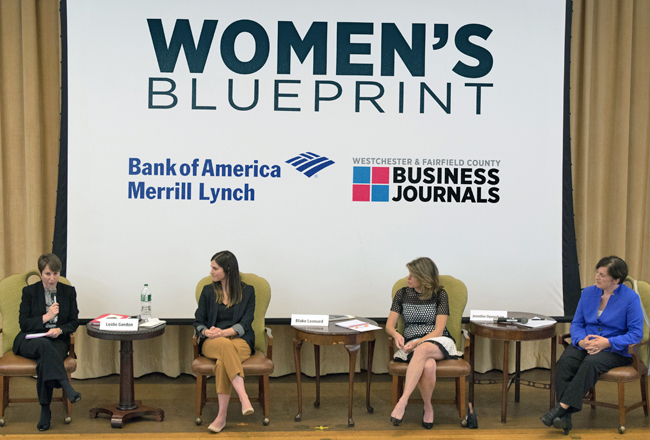
It”™s been more than half a century since the Equal Pay Act was passed by Congress in 1963, but women in the workplace are still striving for true equality, according to panelists at a recent forum regarding women in leadership and business.
In her opening address at Women”™s Blueprint, an Oct. 3 luncheon discussion in Rye, Barbara Roberts, the entrepreneur in residence at Columbia Business School, pointed to pay disparity between men and women ”“ a gap that remains, though it has decreased in recent decades.
In 1969, women earned 57 cents for each dollar earned by their male counterparts, she said. Today, women earn roughly 80 cents of the dollar earned by men. That pay disparity is more pronounced in careers where employees have less flexibility, like financial specialists and surgeons.
“It”™s when there”™s no flexibility, when you can”™t come and go for work,” Roberts said. “That”™s a very good reason why we see so many entrepreneurs step out and start their own businesses.”
Women tend to rely on that flexibility for a number of reasons, but chief among them is child care. “Child care is still the issue we haven’t sorted out,” Roberts said, adding that single, child-free, urban women earn 10 percent more than their male counterparts.
To give employees that flexibility, Maryne Robine, founder of Nantes Solutions, an information technology services company in Stamford, said she offers them flex time and the ability to work remotely. “We have to start trusting our employees,” she said. “With technology now, that”™s possible.”
Another hurdle faced by women in leadership positions is gaining trust.
“There are still some lingering biases to women, but I do think we”™re really seeing that needle change,” Roberts said.
Robine knows those biases firsthand.
“I was a woman in tech, and I think people looked at me like, she”™s a woman and she speaks funny. I don”™t trust her,”™” recalled French-born Robine.
Jennifer Openshaw, founder and CEO of Girls With Impact, a Greenwich nonprofit, said that to overcome some of the obstacles faced in the workplace, women should focus on the value they can bring to an organization. “Then, you become valuable to them, and they”™re going to pay attention to your needs,” she said.
Women can also be plagued with self-doubt or a need to be perfect, which can prevent them from applying for new leadership roles, Roberts said.
“Women only apply to a job when every one of the requirement boxes is checked,” she said. “Every 10 things has to be checked. Men apply when there”™s two of them out of the ten checks.”
Panelist Blake Leonard, a certified sommelier and brand marketing manager at Stew Leonard”™s Wines, said she combats her own self-doubt by shifting her inner dialogue.
“Instead of saying, ”˜Can I do this?”™ we should ask, ”˜How can I do this?”™” she said.
Leslie Gordon, president and CEO of The Food Bank for Westchester, advised women to be comfortable being themselves.
“Don”™t aspire to be like the men who are in the room,” she said. “You don”™t have to be bullish to be a female leader or be super outspoken. You should focus on being good at your business craft.”
She also encouraged women to seek new opportunities and speak up. “Spend time understanding what it takes to get to the next level in your arena, and if you don”™t know, then ask. I think a lot of times, women don”™t do the simple thing, which is ask a question.”
Finding mentors can also be key for women who are starting out in the workplace. When Leslie Gordon first landed her position at The Food Bank for Westchester, she sought out women in leadership positions at other food banks.
“Don”™t be afraid to step out. Even if they”™re at the C-suite level,” she said. “They”™re just people.”
Women”™s Blueprint was sponsored by Bank of America Merrill Lynch and the Westchester and Fairfield County Business Journals.


















